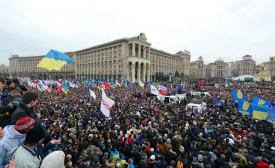ukraine
Pro-Russian protesters have stormed government buildings in three eastern Ukrainian cities. In Donetsk, Luhansk and Kharkiv they clashed with police, hung Russian flags from the buildings and called for a referendum on independence. Ukraine's acting president called an emergency security meeting in response.
McDonald's has suspended work at its three Crimean restaurants following ongoing diplomatic tensions in the region. The company said that it would try to support staff, and hopes to re-open its restaurants as soon as possible. The firm is the second in the Crimea to alter its operations after heightened tensions between Russia and the west.
For the last month and a half I have been following the Ukraine crisis on my Twitter account, and it has offered an unprecedented way to get a real understanding of what people think about the situation and how they think it should be resolved.
The Crimean crisis hits close to home – very close for many in Sacramento, home to one of the largest Ukrainian diaspora communities in the United States. While targeted sanctions against Russia are about to kick in and the tense situation throughout Ukraine remains unpredictable, American policies going forward are likely to be influenced by Ukrainian nationals over time, even after the story fades from current news cycles.

The Crimean crisis hits close to home – very close for many in Sacramento, home to one of the largest Ukrainian diaspora communities in the United States. While targeted sanctions against Russia are about to kick in and the tense situation throughout Ukraine remains unpredictable, American policies going forward are likely to be influenced by Ukrainian nationals over time, even after the story fades from current news cycles.
The United States and the European Union have imposed sanctions on dozens of high-ranking Russians in retaliation for Moscow's seizure and annexation of Crimea. The idea, of course, is that imposing asset freezes and visa bans on these individuals will make them think twice when contemplating, say, further military moves against the rest of Ukraine.
If you don’t know the Ukrainian pop star Ruslana Lyzhychko, you should. She’s known as the Britney Spears of Eastern Europe, except she doesn’t shave her head for attention, she leads political rallies, and she was recently a key figure in the Euromaidanprotests in Kiev.
Halfway through an otherwise coherent conversation with a Georgian lawyer last week—the topics included judges, the court system, the police—I was startled by a comment he made about his country’s former government, led by ex-president Mikheil Saakashvili. “They were LGBT,” he said, conspiratorially.







